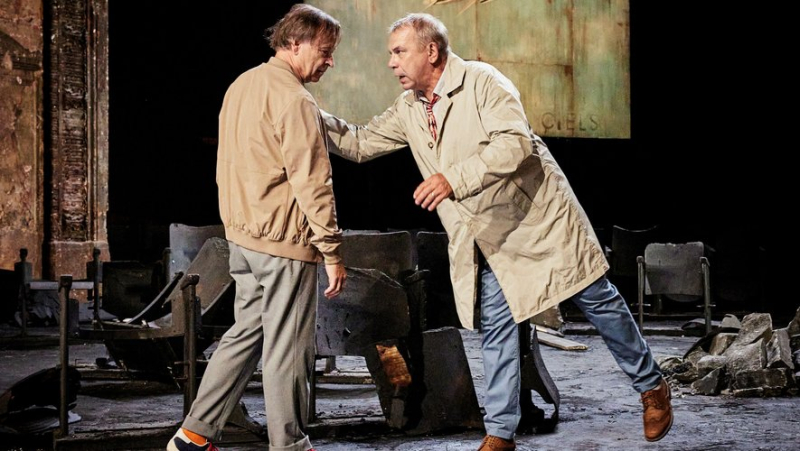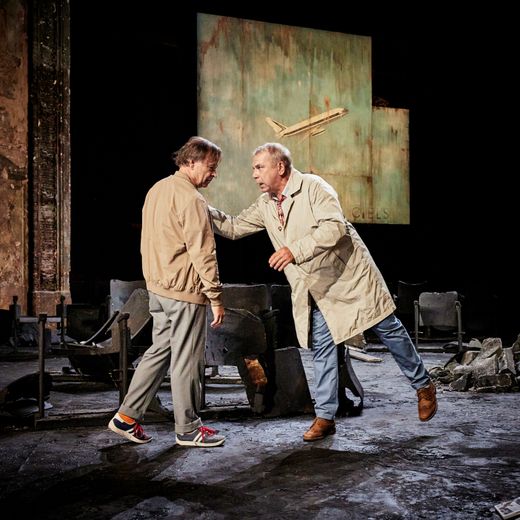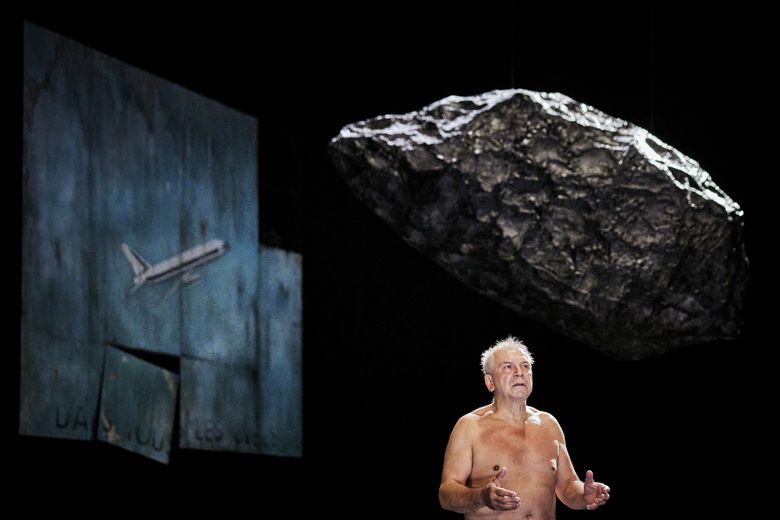“Tenderness is a word that we use without very well measuring its complexity,” explains Fabrice Melquiot, before his show at the Nîmes theater


A play born from the complicity between the two actors, Philippe Torreton and Vincent Garanger. -Christophe Reynaud de Lage
Fabrice Melquiot, author and director, brings together actors Vincent Garanger and Philippe Torreton in Lazzi, to be seen at the Nîmes theater.
How was this piece born, the writing of which is intimately linked to its performers ?
On stage, there are Vincent Garanger and Philippe Torreton, who met on the staging of another of my plays, J' ;took my father on my shoulders. Philippe and Vincent had a sort of professional love at first sight. After the show toured, they asked me to write a text for them and take the project to its production.
We started talking. I proposed other beginnings of texts, before we agreed on the subject of Lazzi which comes from an anecdote that someone told me. When one of the last video clubs closed, I was struck by the squandering of the 40,000 DVDs that constituted the stock.
By telling this story to Philippe and Vincent, we said to ourselves that this could be a good starting point. Immerse yourself in our common, joint memories, added by cinema lovers.
Which world is disappearing with the closure of video clubs ?
There is something very concrete, material that disappears. The film gains in abstraction by being dedicated to streaming. This is what one of the characters mentions. The physical presence of the film in our interiors constitutes a certain form of memory. On a platform, the film is nothing more than an intangible reference. This is another connection to this art.
Beyond this, it is also the weakening of cinema as a meeting place. The cinema proposes the constitution of a more or less silent community in the darkness, to attend together, with neighbors that we have not chosen, which is in state of disappearance. Cinemas have closed, are still closing, are condemned to having to reinvent what this place has been until now.

What place did cinephilia have in the construction of your imagination ?
I passed an audiovisual baccalaureate. I wasn't close to cinema. I was a teenager who loved Bruce Lee and Sylvester Stallone. Registered by accident in this training, I moved on to Jean Renoir, Orson Welles, Fritz Lang. The meeting with these references and with teachers determined my interest not only in cinema, but in writing. Before arriving at the theater, I went through the discovery of the lexicon cinematographic, filmic vocabulary, the scale of the shots…
The title "Lazzi" refers to the grotesque. What does it mean ?
It's a term that we use more in commedia dell'arte. The lazzi is this space preserved for improvisation, joking, a small space of freedom for the actors. At the origin of the project, we said with Philippe and Vincent that it could be interesting to preserve small moments of invention at the heart of the show. Obviously, as the work progresses, these spaces always end up being written more or less.
Today, the value of the word is in another meaning. In Italian, "lazzo" is the link. This is what is at the heart of the play, the bond of friendship between these two men who share their life, a memory, a passion, who also share absent ones, since the one is a widower and the other divorced. Everyone has lost the one they loved, it is a cohabitation that is first endured before being chosen.
As a spectator, if I continue to want, and sometimes need to go to the theater, it's because I'm looking for the connection. I like to witness the links that characters have with each other, which they can also have with spaces. For example, I really like Chekhov's The Cherry Orchard , for the characters but also for the links to a place, to a memory.
This link also goes through the presence of bodies in the staging…
This is also what determined the choice of space. With Raymond Sarti, the scenographer, we could have squeezed the bodies into a few realistic spaces. But very quickly, this significant dimension of the body was important to us. We headed towards a space which is more metaphorical, mental, which brings together several, with both the charred cinema seats, this large panel on which is depicted a plane in flight with the phrase " ;In all the skies", in reference to an old advertisement…
And then, there is this meteorite which descends from the hangers, up to the height of the actors, very slowly during the time of the show. This represents everything that threatens these two men who wonder how to continue to be alive, how to continue to seek their freedom. This is perhaps what we come to look for at the theater: how to question the amount of diktats we receive and how to free ourselves from them ?

A play born from the complicity between the two actors, Philippe Torreton and Vincent Garanger.
We feel that you feel a lot of tenderness for your characters…
It's a word that I really like. It's a word that we use without very well understanding its scope, its complexity. When we talk about tenderness, sentimentality is never far away. While it is a form of elegance of love, of depth. Yes, I feel for the characters of Vincent and Philippe and for the people that Vincent and Philippe are a friendship which tends towards tenderness. And what they hope from each other is tenderness.
There is a character in addition to this duo in the show, it's Orson Welles ?
Not just one… Welles' ghost is one. He comes to meet Philippe and Vincent in this country house. But there is a presence that is also important, it is Emily Loizeau who signs the music for the show. A phrase from Chekhov is quoted in the show, according to which "a story without a woman is like a machine without steam.& quot; Emily, this is the space for absent women.
What do you think of François Truffaut's sentence in La Nuit Americaine, which says that "films are more harmonious than life" ?
One of the missions of filmmakers, of all artists basically, is to give shape to chaos. In this process, there is implicitly a desire for harmony. So yes, I am going in the direction of Truffaut.
Friday March 29 and Saturday March 30, 8 p.m. Bernadette-Lafont Theater, place de la Calade, Nîmes. From 9 € at 33 €. 04 66 36 65 10. I subscribe to read more




